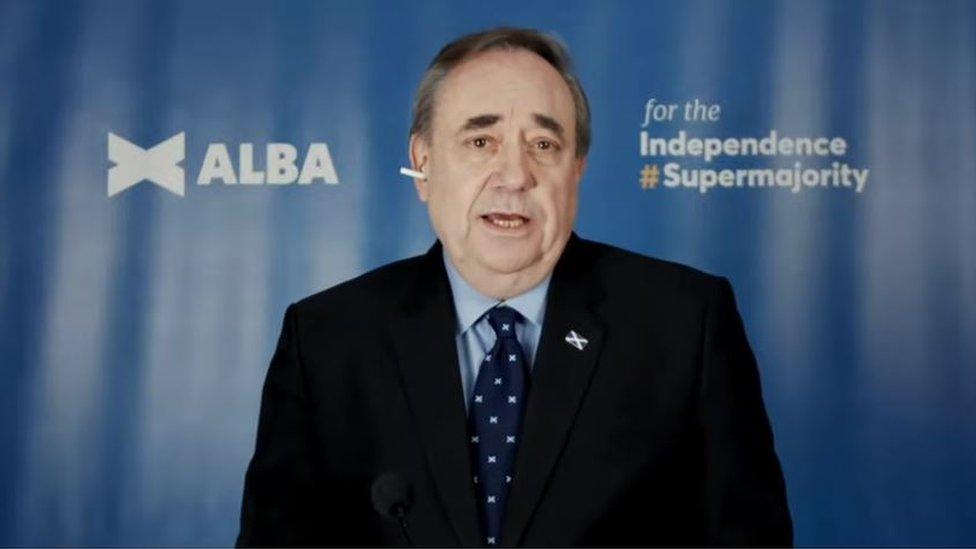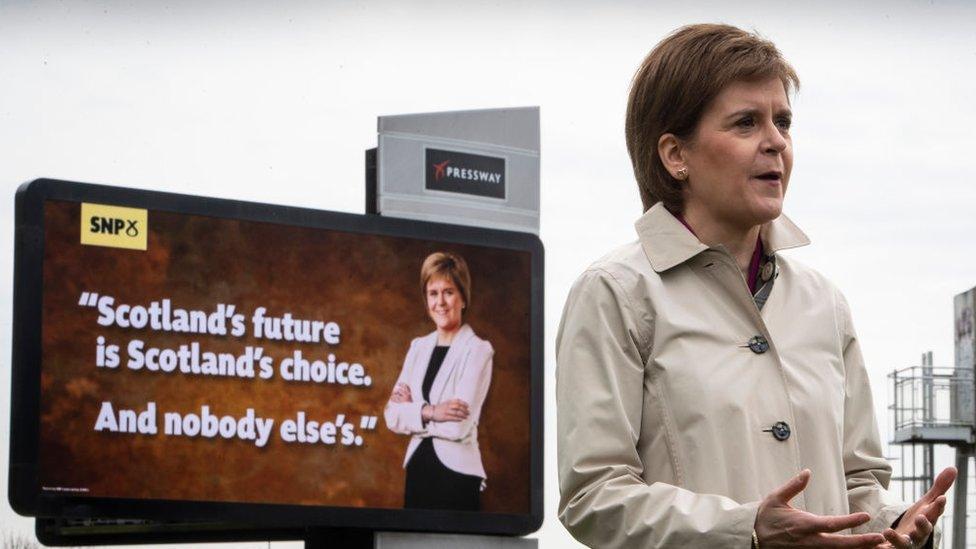Salmond wants independence talks in 'week one' of new Holyrood term
- Published

Alex Salmond said he would be voting SNP in his local constituency, but for Alba on the regional list
Negotiations over Scottish independence should begin in "week one" of the next Holyrood term if there is a pro-independence "supermajority", Alex Salmond has said.
Mr Salmond said the UK government would ignore an SNP victory in the election on 6 May.
But he predicted that its resistance would "crumble" if enough pro-independence MSPs were returned.
He was speaking at the campaign launch of his new Alba Party.
First Minister Nicola Sturgeon has said only a "legal and legitimate" referendum could lead to Scottish independence.
But Mr Salmond - her predecessor as SNP leader and first minister - said the SNP should not "pigeonhole" itself into this position, and that a range of tactics including court action or peaceful protest could be used instead.
Prime Minister Boris Johnson has previously refused to give his backing to a new referendum, saying the vote held in 2014 had settled the issue for a generation.
He has also argued that the country's focus should be on recovering from the Covid pandemic rather than the constitution.
Mr Salmond has launched his new party with the aim of building a "supermajority" of pro-independence MSPs at Holyrood alongside the SNP and Greens, with Alba aiming to win seats via the regional list system.
At Holyrood, a supermajority is generally taken to mean two-thirds of MSPs - or 86 seats - with this total being needed to pass certain legislation.
However when pressed on this Mr Salmond said "that is not the definition of supermajority we are using", without offering an alternative figure.
The former first minister said a substantially pro-independence parliament could "issue a clear and unmistakable instruction to the Scottish government to open negotiations with Whitehall on independence".
He said this "should happen in week one" after an election, and that talks could "evolve" to include the use of a formally agreed referendum, another form of plebiscite, legal action, or peaceful demonstrations.
Mr Salmond also said that he would be voting for the SNP in the constituency ballot, but warned that Mr Johnson would "ignore" an SNP victory - adding that "even if he can ignore a party, he cannot ignore a parliament and a nation".
In an interview with the BBC's Good Morning Scotland programme on Wednesday, Mr Salmond said he believed that the "vast majority of people" wanted to move on from the row between him and Ms Sturgeon over the government's botched handling of sexual harassment complaints that were made against him.
Mr Salmond - who has hosted a chat show on Russian broadcaster RT since 2017 - also did not explicitly blame Russia for the poisoning of Sergei Skripal in Salisbury three years ago.
The UK believes officers from Russia's military intelligence service, the GRU, were behind the poisoning.
But Russian president Vladimir Putin has always denied his country was involved in the Novichok attack, which also left Mr Skripal's daughter Yulia and police officer Det Sgt Nick Bailey in hospital.
The poison later claimed the life of Dawn Sturgess and caused her partner Charlie Rowley - who found the discarded Novichok container - to fall ill.
Mr Salmond was asked on three occasions whether he believed Russia was behind the poisoning.
He replied: "The evidence was presented at the time. I'm struggling to see what this has got to do with a Scottish election campaign."
He later added: "Evidence came forward as contested. I said it should go to the international tribunals and courts. I said that at the time and I think the evidence came forward and people can see it for what it is."
Mr Salmond also insisted that his show on RT had complete editorial independence, and said suggestions that Russia interfered in the 2014 independence referendum were "laughable".

Nicola Sturgeon has said she "could not envisage" working with Mr Salmond or his new party
The SNP has set out an 11-point "roadmap" which it wants to pursue towards independence - which Mr Salmond said "may have 10 points too many".
Ms Sturgeon has argued that only a "legal referendum" in the style of the 2014 vote will have the legitimacy to actually deliver independence - and has said she wants the vote to be held in the first half of the five-year Holyrood term.
She said she "could not envisage" working with her predecessor, who has in recent months accused her of breaching the ministerial code and claimed there was a "malicious plot" against him among senior SNP figures.
The SNP leader said Mr Salmond's approach "hinders the cause of independence rather than helps it", and was not "particularly helpful" in winning round a majority of the population.
She added: "We can't bulldoze our way to independence - we have to build support, persuade people, win trust and confidence.
"And when I listen to what is coming out of his new outfit I fear that is more likely to drive the undecided former No voters that we need to attract away from the independence cause rather than to us."

SCOTLAND'S ELECTION: THE BASICS
What elections are happening? On 6 May, people across Scotland will vote to elect 129 Members of the Scottish Parliament (MSPs). The party that wins the most seats will form the Scottish government. Find out more here.
What powers does the Scottish Parliament have? MSPs pass laws on most aspects of day-to-day life in Scotland, such as health, education and transport. They also have control over some taxes and welfare benefits. Defence, foreign policy and immigration are decided by the UK Parliament.
How do I vote? Anyone who lives in Scotland and is registered to vote is eligible, so long as they are aged 16 or over on the day of the election. You can register to vote online, external.

The Scottish Conservatives are opposed to a new independence referendum, arguing that it would put the country's recovery from Covid-19 at risk.
Leader Douglas Ross said: "The last thing Scotland needs is more uncertainty and a new constitutional crisis on top of the health and economic crisis we're facing."
Scottish Labour has also opposed a new referendum in the immediacy, with deputy leader Jackie Baillie describing Mr Salmond's plan to start negotiations just days after the election as an "insult to all those jobs and livelihoods that are still at risk" from the pandemic.
She added: "Nicola Sturgeon cannot endorse this extreme approach to the constitution and needs to be clear that she will not bulldoze this through the parliament with an ugly allegiance with Salmond's Alba Party."
The Lib Dems are also against independence, with leader Willie Rennie saying Scotland "must be utterly focused on recovering" from the pandemic.
However the Scottish Greens are in favour of independence, with co-leader Lorna Slater saying her party "could yet play a crucial role" in securing a majority behind it at Holyrood.

POLICIES: Who should I vote for?
PODLITICAL: Updates from the campaign
